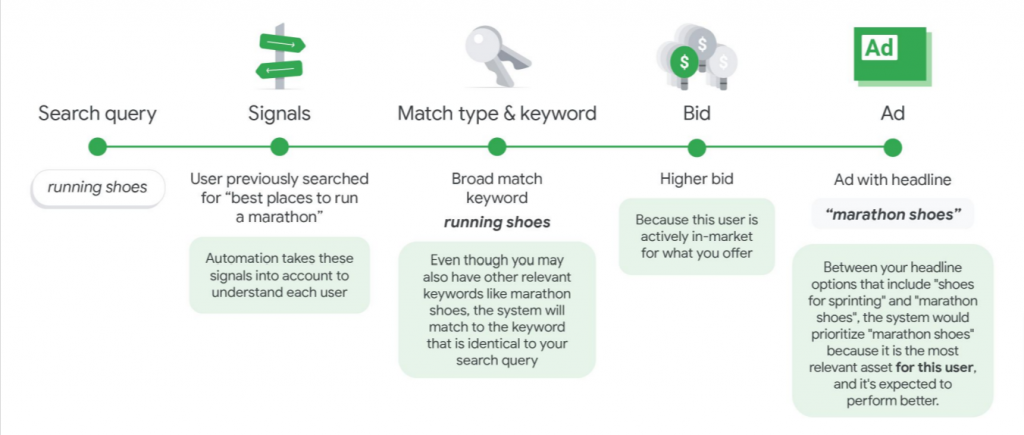In the PPC space, automation brings ease and good results. Google Ads automation tools assist you in setting up automatic triggers for your campaigns. It can be a powerful way to improve a campaign’s performance.
Whether we like it or not, Google has always relied on some degree of automation and it’s a struggle to find a proper balance between manual management and machine learning. But Google has made this easy lately.
Google recently made a search automation guide available to assist advertisers in finding potential clients. Those who are against automation will benefit from this approach as well. This manual will answer all questions regarding automation, bid strategy, and keyword match types.
Broad Match Keyword Strategy With Smart Bidding
Keyword match types help to match user searches to your keywords and ads. Google has Broad, Phrase, and Exact match types and all these match types have gone through changes over a period of time.
Broad match is not so famous amongst advertisers as it doesn’t help in controlling irrelevant clicks and wasted ad spend. But, In its recently published guide, Google has attempted to help users better understand why they should use Broad match. When you utilize broad match, the system also examines extra signals in your account to match more relevant traffic.
As per Google
A broad match is the only match type that makes use of every piece of information offered by Google Ads to evaluate the purpose of both the user’s search and your keyword.
Therefore, using a broad match with Smart Bidding will help bring in more relevant searches for the business that is thought to perform in line with your aims.
Utilizing Smart Bidding Strategies
Google claims that automation simplifies how you manage and set up your campaigns. This guide helps to understand why using a clever bidding structure is recommended when using broad keywords.
As per Google, you may simplify your accounts by utilizing Smart Bidding strategies with broad match-only campaigns.
In campaigns with a target CPA, advertisers who switch from exact match to broad match keywords experience an average 35% increase in conversions.
In campaigns with a target ROAS, advertisers can notice an average increase of 20% in conversion value by switching their exact match keywords to broad match.
Because these strategies can help you achieve more conversion, testing smart bidding strategies can be a great idea but one needs to take care of spending and conversion changes.
Broad Match in Combination With Responsive Search Ads
Responsive search ad is the default ad type now for search campaigns in Google ads. RSAs help to show more relevant ads to more people. A broad match is effective for creative automation. You can enter several headlines and descriptions in a responsive search ad, and Google will decide which combinations perform best across all of the traffic that broad match gives.
As per Google
Advertisers that switch from expanded text ads to responsive search ads, using the same assets, in campaigns that also use broad match and Smart Bidding, see an average of 20% more conversions at a similar cost per conversion.
A certain amount of automation is permitted by responsive search ads, but only within the parameters that you specify. Here is an infographic to understand how responsive ad works with smart bidding and broad match.

Keyword Theming
Keyword themes allow you to match your ads with users’ search queries. It is available in the smart campaign where it can cover multiple words and phrases. Google’s findings mentions
Grouping your keywords into similar themes makes it easier for Google to understand your keywords, select the best one, and determine which ad should serve for each query.
By looking at the ad strength, you can know if our ad copy incorporates the concepts from your keywords. As per the guide, Ad Strength consists of two parts:
- the overall score that represents the efficiency of a relevant ad and,
- the precise action item(s) that can help the ad.
When you make changes to your keywords, Ad Strength will reflect those changes to show how well your ads are matching to those keywords.
Google’s search automation guide PDF can be downloaded here.
Wrapping It Up
For many advertisers, automation is simply not possible but Google’s Search Automation Guide makes all the effort to help users adopt the best practices defined in this guide. Maintaining accounts manually, waste a lot of time and can have a high margin of errors. This guide explains how responsive search ads and smart bidding, two automated tools, may be used in conjunction with Google Ads keywords to give you the best reach, relevance, and performance in any situation.
Related Links





Stop the wasted ad spend. Get more conversions from the same ad budget.
Our customers save over $16 Million per year on Google and Amazon Ads.